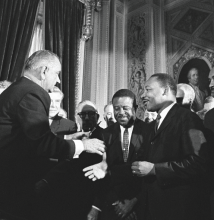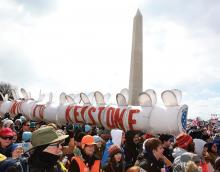fight

BACK IN THE day, when Stevie Wonder was Wishing “those days could come back once more,” my 6-, 7-, and 8-year-old friends and I had no idea what the heck he was talking about, but we loved the groove and would blast Wonder’s Songs in the Key of Life album from our front steps as we played in front of my house in our West Oak Lane neighborhood of Philadelphia.
Sometimes the boys would coast down the street on handmade skateboards, literally made of old skates—the kind with wheels you strapped to your shoes—nailed to short wooden planks. Sometimes the girls and boys would race each other down a steep street, flying at lightning speed on bikes and boards, to see who could make it first to the candy shop at the bottom of the hill. And sometimes, in all the play, a verbal sparring match would break out:
“You so big,” one friend would say, “it take two showerheads to clean yo big butt in the morning!” Then the 7-year-old sparring partner would come back: “Oh, yeah?! You so ugly, yo mama say ‘What dat?’ when she give birth to you!”
It would keep going and we’d all laugh out loud until someone got inappropriate. Usually inappropriateness began with three words: “Yo mama so ...” We all knew to never bring someone’s mother into the sparring match unless you wanted to fight for real. Those were fighting words.
This summer the Supreme Court got inappropriate. They spewed fighting words on the playground that is our national public square.

ALL I EVER wanted to see was a movement of people to stop climate change, and now I've seen it. And it looks so beautiful. It's hometown heroes like our friends in D.C. who've been fighting coal plants, and far-flung heroes like those who've been bravely blocking the Keystone XL pipeline with their bodies in Texas. It's people who understand that the fight against fracking and coal ports and taking the tops off mountains is ultimately the fight for a living planet; it's people who have lived through Sandy and survived the drought, some of whom I got to go to jail with recently.
It's the students at 252 colleges who are now fighting the fossil fuel industry head on to force divestment of their school's stock—the biggest student movement in decades. It's all of you—you are the antibodies kicking in, as the planet tries to fight its fever.
We've waited a very long time to get started, I fear. We've already watched the Arctic melt; our colleagues in 191 countries tell us daily of some new drought or flood.
Because we've waited this long, the easiest answers are no longer enough; we're going to have to make tough decisions. Our theme has to be: When you're in a hole, stop digging. Above all stop the Keystone XL pipeline. The president can do it with a single stroke of his pen, and if he does he will become the first world leader to veto a big project because it's bad for the climate. That would be a legacy—and a signal to the rest of the world that we're serious about this fight. It's his test.
The disturbing footage of the monks fighting in Bethlehem’s Nativity Church has been seen around the world. This is not the first time such a fight has erupted. The natural reaction any Christians should have upon seeing this footage is shame. It is difficult to even describe in words what one feels when he sees Christian clerics involved in such violence and rage!
This incident reflects at least two major deficiencies within the Palestinian Christian community. The first is the status of the church and how it is still controlled by foreign powers. Palestine and the "holy sites" have always attracted Christians who want to control these places. Everyone wants a share of the place. This is the story of the church in Palestine in a nutshell. Though we have called this place home for centuries, we have never in reality governed ourselves, as a people or as a church. Wars have emerged over control of the sites, from the crusaders, through the Crimean War, to our modern era, where a fragile "status quo" from the days of the Ottoman Empire governs the relationship between the different church families and who controls what in the holy sites.